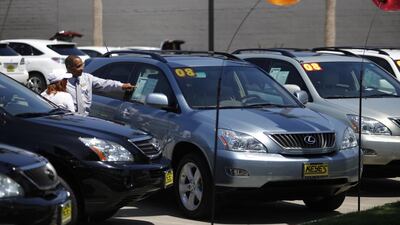The editors at The National give me constant feedback on how my articles are received. A recent article of mine using game theory as a lens into the persistent oversupply of banks in the UAE was widely read, garnering many hits online. They informed me that the interest was due to the consumer-driven view of the article.
In a follow-up article I proposed how shareholders could improve the sector via the inclusion of activist asset managers.
Today I would like to touch upon how consumers, be they in the financial services sector or other sectors, might be able to drive improvements in products and services sold to them.
Sometimes one has to find a completely new solution. Other times one can look at analogies. In this case the solution actually exists in another market. It not only exists, it is extremely powerful. Consumers, if you have never heard of it please let me introduce you to the most powerful consumer protection product on Earth – Consumer Reports, a magazine that tests, reviews and compares products and services offered in the American market.
Before describing what they do, let me describe the effect that they have had. Because of issues exposed and published by Consumer Reports the car makers Dodge/Plymouth, Nissan, BMW and Chrysler made changes to certain car models to fix the deficiencies exposed. In 2010, Consumer Reports labelled one of Toyota's Lexus models as unsafe. The respect that Consumer Reports had built by this time was so great that Toyota temporarily suspended sales of that particular Lexus even before they had confirmed the issue. Toyota subsequently confirmed that there was indeed a material safety issue and recalled that particular model.
I have to emphasise the significant role that the magazine had reached – Toyota suspended sales of a car model from its exclusive Lexus line based solely on the magazine's conclusions. What enhanced Consumer Reports' reputation is that Toyota replicated the failure and issued a recall of the model. The fact that a global business giant had so much respect for the magazine, or, if you are cynical, fear of consumer backlash, that it blindly suspended sales of the vehicle tells you a lot about the power of consumers if harnessed as a collective voice.
So why is Consumer Reports so influential with retailers? It is because the magazine is trusted by consumers and therefore its reports have a material ffect on consumer spending patterns, which in turn has the power to make or break a retail product or service. Just like an activist asset manager can act as the representative of a diverse group of shareholders, Consumer Reports performs the same service but for consumers.
What do we have in the UAE? I have seen two main areas – consumer rights and price comparisons. Consumer rights deals with the legal rights of a consumer and is probably best exemplified by the Dubai Economic Department’s (DED) consumer rights effort (consumerrights.ae).
The DED’s consumer rights drive is neither unique in the UAE nor has it yet reached its full potential, although it is moving fast in that direction. But what the DED has managed to do better than any of their contemporaries in the country is deliver the message to consumers that they actually do have rights. The DED effort has also made it much easier for consumers to understand what those rights are, for example via posters in retail outlets, as well as how to redress any breaches.
On the private sector side there are a handful of internet sites that provide price comparisons in narrow categories, such as electronics or automobiles. Some even provide reviews, but I have yet to find one that provides comparisons. An interesting example is CellSouq.com, which is one example of a service that appears to be well on its way to be a Consumer Reports for the Middle East.
These two approaches do not on their own provide the full range of consumer protection services that Consumer Reports does, but they are a strong start and point us in the right direction. The question is how do we get to the next level? Perhaps International Consumer Research & Testing, a global effort looking to provide the same services as Consumer Reports might be a springboard.
The timing is also perfect. At a time of economic expansion retailers rarely care about consumers and, to be frank, consumers are in a stronger financial position and will usually care less. But in times of economic contraction the consumer tracks every dirham spent and retailers are scrambling to maintain market share.
In times of stress there is often opportunity.
Sabah Al Binali is an active investor and entrepreneurial leader with a track record of growing companies in the Mena region. You can read more of his thoughts at Al-binali.com
business@thenational.ae
Follow The National's Business section on Twitter

